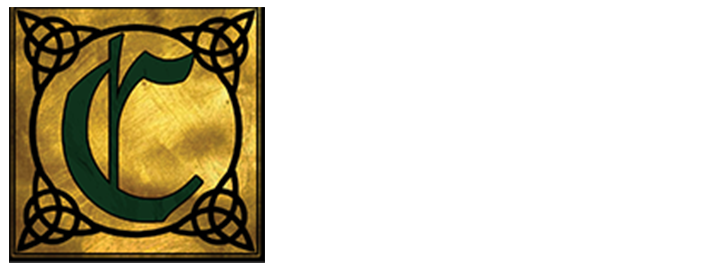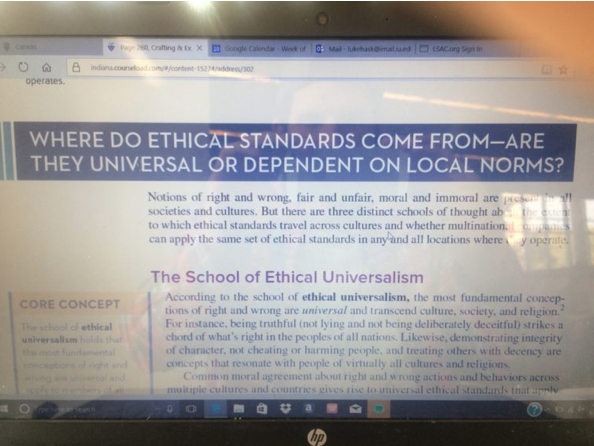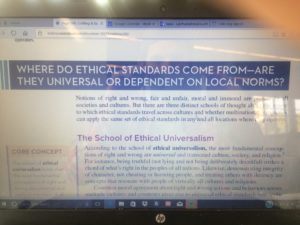It was just more of the same.
Comenius students and I text throughout the week: when I will be on campus, prayer requests, helpful essays about their studies, and what they are learning in class.
 The screen shot above is an example of a classroom message.
The screen shot above is an example of a classroom message.
“Where do ethical standards come from? Are they universal or dependent on local norms?”
A student had been sending me texts about a long-standing, long-running interaction about the source of ethics in their* discipline.
I asked about the source or origin of “local norms.”
“Good news!” came the reply. “All truth of morality and origin can be traced back to the American _________ Association!** Problem solved!
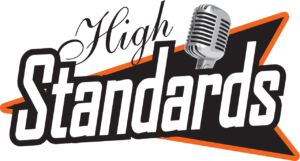 Mentioning that I would be willing to drop by class sometime to offer an alternative explanation for ethical standards, my young friend said,
Mentioning that I would be willing to drop by class sometime to offer an alternative explanation for ethical standards, my young friend said,
“The prof would be less than thrilled to justify their answer. Accountability is a stubborn thing.
Another text appeared on my phone.
“It just got better. We were discussing ethical situations such as lying to customers about the use of survey data and the prof used the curious phrase to initiate participation: ‘There are no right or wrong answers here.’
The student continued, “I looked around the room for someone to be as incredulous as I was but clearly it did not strike anyone else as an ironic phrase.”
In a different class, the same student was reading the textbook basis for “standards.” [Screen shot above] The text claimed that there are three sources for ethical standards: universalism (based on outside, transcendent sources), relativism (based on individual choice), and something called “social responsibility.” The last standard gets its sources from whichever camp makes the most instinctive sense.
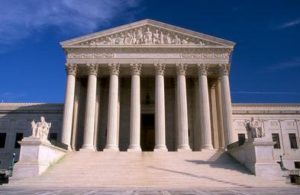 BUT where does ‘responsibility’ come from? Whose ‘social’ are we talking about?
BUT where does ‘responsibility’ come from? Whose ‘social’ are we talking about?
Two questions I ask over and over about any discussion point include:
-
What is the source or origin of the subject, idea, or standard?
-
What is the end result, the consequence of any action based on the standard?
 Let’s take this a step further: what happens if Christian standards based on a transcendent, universal source, are removed from cultural influence?
Let’s take this a step further: what happens if Christian standards based on a transcendent, universal source, are removed from cultural influence?
Doing a radio interview this week I referenced Damon Linker’s article “The Dangers of the Great American Unchurching” (here). What happens if a transcendent, universal standard is removed from discussions of ethics? Mr. Linker cites the result of losing Christian influence on societal standards:
“a precipitous collapse in the power of the churches in American public life.”
Why are transcendent ethical standards so important? Here are just three examples:
-
The concept of rights (human or civil) is directly derived from transcendent authority. If governments grant rights, governments can take them away. If God grants rights, they should not be taken away. Government’s responsibility is to protect them.
-
The importance of accountability (business or governmental) has its roots in a universal requirement. Duty and obligation have no foundation without worldwide, common regulations.
-
The idea of law itself (judicial or legislative) is predicated on an external origin. “Life” and ‘freedom” derive their mandate from a divine source. Human origins for law shift and change based on who is in authority.
The student is right to question the source of ethical standards in their discipline.
Without a transcendent origin, ethics depend on a roll of the dice.
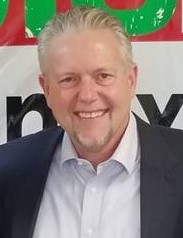 Mark believes two biblical doctrines frame all of life: absolute truth and human nature. The first provides a standard for life, the second makes us all responsible. Dr. Mark Eckel is President of The Comenius Institute (website), spends time with Christian young people in public university (1 minute video), hosts a weekly radio program with diverse groups of guests (1 minute video), teaches weekly at his church (video), and depends on a transcendent source of ethics like everyone else. [Hear the 8 m radio interview “Why the culture needs The Church.”] Picture credit: snappygoat.com
Mark believes two biblical doctrines frame all of life: absolute truth and human nature. The first provides a standard for life, the second makes us all responsible. Dr. Mark Eckel is President of The Comenius Institute (website), spends time with Christian young people in public university (1 minute video), hosts a weekly radio program with diverse groups of guests (1 minute video), teaches weekly at his church (video), and depends on a transcendent source of ethics like everyone else. [Hear the 8 m radio interview “Why the culture needs The Church.”] Picture credit: snappygoat.com
* using the improper pronoun “their” protects the student’s identity
**using a fill-in-the-blank protects the class’s identity
